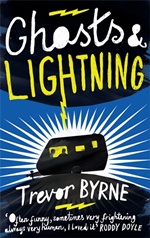Debut novel shows signs of promising young writer

Recently published in paperback, Trevor Byrne’s debut novel Ghosts and Lightning bristles with the vernacular of Dublin’s working class. By Shane Creevy.
The novel is often touching and funny at the same time; no doubt the tale of the escaped white-haired Japanese monkey will linger in your mind for some time!
But the tale centers around Denny, the narrator, who has returned to Dublin from Wales following the death of his mother.
As he alights upon Dublin’s docks, he sees the city as if for the first time. He is not particularly proud of what he sees. Much of the rest of the book continues in that vein.
Perhaps one of the most illuminating images in the novel is near the beginning. Denny, only off the boat a few moments, walks along O’Connell Street surrounded by drunkards and destitution.
“A longhaired man in a Chelsea jersey pisses against one of the GPO’s Ionic columns, still pocked with British bulletholes, and a shout goes up from a garda in a deep Donegal accent. The man breaks and runs with his penis flopping, his mates laughing on the corner of Middle Abbey Street some yards behind”.
Denny takes up residence with his sister Paula in Clondalkin. The only way she knows to deal with their mother’s death involves consuming large quantities of alcohol and Denny quickly becomes embroiled in a mystifying world of drink, drugs and séances in the night.
Séances are taken very seriously by his friend Pajo, who believes he can commune with the dead. When Paula feels the presence of a ghost under her bed it is up to Pajo to ‘make contact’.
Being a debut novel - and one is desperate not to criticise debut novels - Ghosts and Lightning may be open to the criticism that it tries to do too much.
After a rather frightening ‘connection’ with the dead, the plot veers sharply in another direction with no resolution of Denny’s feelings about his mother or father, or the commune with the dead.
This is not to argue that the book becomes anything less than entertaining. It continues to move forward at a pleasant pace.
But after the first hundred pages or so, the novel becomes a kind of summary of life for Denny, rather than a continued exploration of the first hundred pages.
And so the reader learns of suicide among Denny’s friends, gang wars with drug dealers and other such incidents.
“It may sound a bit mad, like, but the casual admittance of attempted suicide isn’t that much of a shock to me. Not when yeh know someone like Kasey. I wouldn’t say it happens every five minutes or anything but it’s not earth shatterin, either”.
Ghosts and Lightning tells the tale of Dublin’s poor – but doesn’t celebrate the working class. Instead the real hero of the novel is stories themselves.
Denny is obsessed with reading and wrestling, both of which offer him a narrative through which he can understand the world.
“Stories though, man. The way they work on yeh. They’re a kind of spell, aren’t they? Or a prayer, maybe, some o them. An article o faith. How the fuck else can yeh make sense o things, like? Yer fucked without them. There has to be meanin. It’s not just all fuckin... like... evolution or wharrever. Cells and impulses. There’s got to be stories as well”.
Amen to that.

Ghosts and Lightning by Trevor Byrne
Canongate
Paperback, pp 329
£7.99
